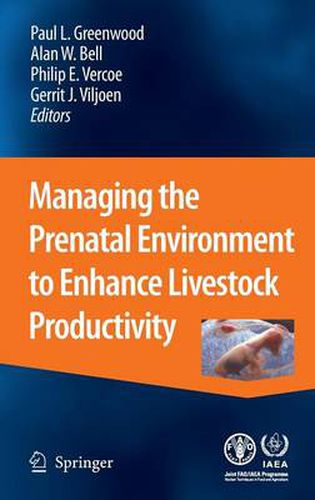Readings Newsletter
Become a Readings Member to make your shopping experience even easier.
Sign in or sign up for free!
You’re not far away from qualifying for FREE standard shipping within Australia
You’ve qualified for FREE standard shipping within Australia
The cart is loading…






This title is printed to order. This book may have been self-published. If so, we cannot guarantee the quality of the content. In the main most books will have gone through the editing process however some may not. We therefore suggest that you be aware of this before ordering this book. If in doubt check either the author or publisher’s details as we are unable to accept any returns unless they are faulty. Please contact us if you have any questions.
Prenatal life is the period of maximal development in animals, and it is well recognised that factors that alter development can have profound effects on the embryonic, fetal and postnatal animal. Scientists involved in research on livestock productivity have for decades studied postnatal consequences of fetal development on productivity. Recently, however, there has been a surge in interest in how to manage prenatal development to enhance livestock health and productivity. This has occurred largely due to the studies that show human health in later life can be influenced by events during prenatal life, and establishment of the Fetal Origins and the Thrifty Phenotype Hypotheses. This book, Managing the Prenatal Environment to Enhance Livestock Productivity reviews phenotypic consequences of prenatal development, and provides details of mechanisms that underpin these effects in ruminants, pigs and poultry. The chapters have been divided into three parts: Quantification of prenatal effects on postnatal productivity, mechanistic bases of postnatal consequences of prenatal development and regulators of fetal and neonatal nutrient supply.
Managing the Prenatal Environment to Enhance Livestock Productivity is a reference from which future research to improve the level of understanding and capacity to enhance productivity, health and efficiency of livestock in developing and developed countries will evolve. It is particularly timely given the development of molecular technologies that are providing new insight into regulation and consequences of growth and development of the embryo, fetus and neonate.
$9.00 standard shipping within Australia
FREE standard shipping within Australia for orders over $100.00
Express & International shipping calculated at checkout
This title is printed to order. This book may have been self-published. If so, we cannot guarantee the quality of the content. In the main most books will have gone through the editing process however some may not. We therefore suggest that you be aware of this before ordering this book. If in doubt check either the author or publisher’s details as we are unable to accept any returns unless they are faulty. Please contact us if you have any questions.
Prenatal life is the period of maximal development in animals, and it is well recognised that factors that alter development can have profound effects on the embryonic, fetal and postnatal animal. Scientists involved in research on livestock productivity have for decades studied postnatal consequences of fetal development on productivity. Recently, however, there has been a surge in interest in how to manage prenatal development to enhance livestock health and productivity. This has occurred largely due to the studies that show human health in later life can be influenced by events during prenatal life, and establishment of the Fetal Origins and the Thrifty Phenotype Hypotheses. This book, Managing the Prenatal Environment to Enhance Livestock Productivity reviews phenotypic consequences of prenatal development, and provides details of mechanisms that underpin these effects in ruminants, pigs and poultry. The chapters have been divided into three parts: Quantification of prenatal effects on postnatal productivity, mechanistic bases of postnatal consequences of prenatal development and regulators of fetal and neonatal nutrient supply.
Managing the Prenatal Environment to Enhance Livestock Productivity is a reference from which future research to improve the level of understanding and capacity to enhance productivity, health and efficiency of livestock in developing and developed countries will evolve. It is particularly timely given the development of molecular technologies that are providing new insight into regulation and consequences of growth and development of the embryo, fetus and neonate.